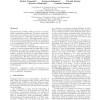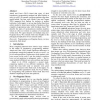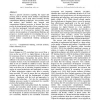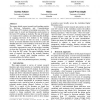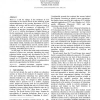ACE
2015
8 years 7 months ago
2015
This paper presents a macro-level view around exam composition. While previous work known as BABELnot (Lister et. al. 2012 [1]) developed a micro-level classification scheme to co...
ACE
2015
8 years 7 months ago
2015
Computational Thinking skills are basic and important to manipulate computers. Currently, several systems exist to provide an effective way to learn programming that use computer...
ACE
2015
8 years 7 months ago
2015
Compared to many other disciplines, ICT has relatively few students choosing to continue into doctoral studies. We have explored some of the perceived barriers to undertaking doct...
ACE
2015
8 years 7 months ago
2015
1 Ahadi and Lister (2013) found that many of their introductory programming students had fallen behind as early as week 3 of semester, and those students often then stayed behind. ...
ACE
2015
8 years 7 months ago
2015
There is general consensus regarding the urgent and pressing need to develop school students' computational thinking abilities, and to help school teachers develop computatio...
ACE
2015
8 years 7 months ago
2015
This paper reports on an investigation of the teaching context of first-year Information and Communications Technology (ICT) courses at Australian universities and the influences ...
ACE
2015
8 years 7 months ago
2015
Flipped learning has been the subject of significant hype and attention but descriptions of the development and the evaluation of this pedagogical model are lacking. Flipped lear...
ACE
2015
8 years 7 months ago
2015
This paper details current research and teaching practice for first-year Information and Communications Technology (ICT) students at Australian universities. The project aims to r...
ACE
2015
8 years 7 months ago
2015
With large classes and high demands on the time of teaching academics, (as well as the need to keep marking budgets under control) evaluating the functional correctness of program...
ACE
2014
10 years 6 months ago
2014
There is a call for change in the treatment of ICT curriculum in our schools driven by the relatively recent acknowledgement of the growing importance of ICT in industry and socie...

